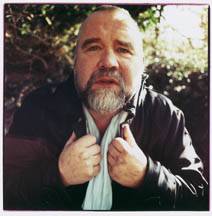My friend, former (WEFT) Out of Our Heads co-host and current Florida State University Professor, Barry J. Faulk, put one of those “won’t go away” ideas in my head last week via his response to an earlier e-mail message I had sent him regarding the death of musician John Martyn. Pithy as always, Mr. Faulk nailed the finer quality of Martyn’s gift, noting the elusive yet essential distinction between mixing and fusing:
To me, the most impressive thing about Martyn is his seemingly effortless fusion of musical genres. I know, a lot of people get praised for creating musical hybrids, the early Clash or the Police get a lot of cred, or used to, for mixing reggae and rock, but what Martyn did was far more difficult than mix and match. He had the true alchemist gift for FUSING different styles — Skip James and Lee Perry, cool jazz and folk intimacy — so that disparate parts that would never seem to work on paper ended up making perfect sense. I think the creation of genuine, listenable musical hybrids is a very rare thing, but Martyn seemed to do it regularly.
 I have no idea what possessed people to think they could transform lead into gold. I suppose the usual reasons apply: money/fame/success. I also don’t know if any would-be alchemists ever thought metaphorically about their project, about the abundance of analogues to their enterprise offered by the parallel art universe, a “place” where the banal and the exotic are fused together daily to form something unique. One could argue that most art is a transformation of what’s come before, a purposeful mish-mashing of past, present and future. So construed, the hallmark of great art is the absence of seams, an almost complete erasure of all signs of influence.
I have no idea what possessed people to think they could transform lead into gold. I suppose the usual reasons apply: money/fame/success. I also don’t know if any would-be alchemists ever thought metaphorically about their project, about the abundance of analogues to their enterprise offered by the parallel art universe, a “place” where the banal and the exotic are fused together daily to form something unique. One could argue that most art is a transformation of what’s come before, a purposeful mish-mashing of past, present and future. So construed, the hallmark of great art is the absence of seams, an almost complete erasure of all signs of influence.
We lost a creator of such art last week when John Martyn died at the age of 60 after seemingly endless bouts with various health problems. Martyn was one of those musicians/performers who cannot easily be tagged or summed up in a convenient phrase. To call him a folk performer, while technically true, falls far short of telling anything like the whole story. Mentioning his prowess as a singer and guitar player doesn’t necessarily reflect the range of skill he demonstrated and developed in each arena. This was a guy who could not stand still, the catalogue of his Island Records years alone offering an almost mind-boggling range of material: from the solo acoustic material exploring the jazzed atmospherics of mentor Davy Graham, to the late ’60s folk-rock of his work with then-wife Beverley, to the echoplexed wizardry of his Bless the Weather period, and the sheer majesty of his first true hybrid masterpiece Solid Air. And then, right when there didn’t seem to be anywhere new to go, he pulled a Dylan and left the folk world pretty much behind, culminating in the back-to-back triumphs of One World and Grace and Danger, twin embodiments of the apotheosis of his musical alchemy.
 If alchemists labored to turn lead into gold, Martyn worked just as feverishly at giving musical expression something like liquid form. The clear trajectory of his post-Beverley-work is a state of sinuousness, a gentle and delicate movement that doesn’t call attention to itself, an organic melodiousness that seems to ooze out of its gently rolling accompaniment. If music at its most elemental form is numeric in nature, given to notation and metronomic insistence, late-Island period Martyn removed all surface level hints of such structure, distilling form to essence, suggesting rather than stating. Check out the ethereal “Small Hours” from One World, its simple, stark instrumental minimalism framing vocals which literally seem breathed rather than sung. Even when the rhythm is more insistent, as it is on One World‘s opener, “Dealer,” it rolls more than rocks, it tumbles rather than marches. By the time you get to the modified pop ditty that is Grace and Danger‘s “Sweet Little Mystery,” there is no doubt that Martyn’s alchemy knows no limitations, that it can transform everything it touches, every genre, every musical trope and form.
If alchemists labored to turn lead into gold, Martyn worked just as feverishly at giving musical expression something like liquid form. The clear trajectory of his post-Beverley-work is a state of sinuousness, a gentle and delicate movement that doesn’t call attention to itself, an organic melodiousness that seems to ooze out of its gently rolling accompaniment. If music at its most elemental form is numeric in nature, given to notation and metronomic insistence, late-Island period Martyn removed all surface level hints of such structure, distilling form to essence, suggesting rather than stating. Check out the ethereal “Small Hours” from One World, its simple, stark instrumental minimalism framing vocals which literally seem breathed rather than sung. Even when the rhythm is more insistent, as it is on One World‘s opener, “Dealer,” it rolls more than rocks, it tumbles rather than marches. By the time you get to the modified pop ditty that is Grace and Danger‘s “Sweet Little Mystery,” there is no doubt that Martyn’s alchemy knows no limitations, that it can transform everything it touches, every genre, every musical trope and form.
A modernist folk singer living in a postmodern world, Martyn eventually strolled through nearly every kind of popular music, leaving behind astonishing sonic hybrids reflecting both their generic history and his quicksilver touch. That few in this country have heard him only adds to the scope of his achievement. He did what he did without benefit of substantial financial reward, without regard to anything other than his own sense of accomplishment. The truly good thing about the digital ubiquity of recorded music is it’s never too late or too daunting a task to discover a natural treasure. Check out the following YouTube videos and see what you’ve been missing.
A live solo acoustic performance of “Spencer the Rover”:
A live duo electric guitar setting for “Big Muff” (featuring Danny Thompson on bass):
A live solo echoplexed acoustic performance of “Dealer”:
A visually dodgy, sonically unbelievable live solo acoustic version of “I’d Rather Be the Devil”:
A live solo acoustic performance of his signature tune, “May You Never”:








